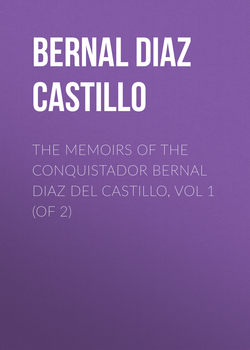Читать книгу The Memoirs of the Conquistador Bernal Diaz del Castillo, Vol 1 (of 2) - Bernal Diaz del Castillo - Страница 38
CHAPTER XXXVII
ОглавлениеHow Doña Marina herself was a caziquess, and the daughter of distinguished personages; also a ruler over a people and several towns, and how she came to Tabasco.
Previous to going into any details here respecting the powerful Motecusuma, his immense kingdom of Mexico, and its inhabitants, I must relate what I know of Doña Marina. She was born a ruler over a people and country, – for her parents had the dominion of a township called Painala, to which several other townships were subject, lying about twenty-four miles from the town of Guacasualco. Her father died when she was very young, and her mother married another young cazique. By him she had a son, of whom it appears they were both very fond, and to whom, after their death, they designed to leave their territories. In order, however, that the daughter of the first marriage might not stand in his way, she was conveyed secretly during night-time to an Indian family in Xicalango, they spreading the rumour she had died, which gained further belief from the circumstance that a daughter of one of her female slaves happened to die at the time. The Indians of Xicalango did not keep the young girl themselves, but gave her to the inhabitants of Tabasco, by whom she was presented to Cortes. I knew her mother and half-brother myself, the latter having already reached manhood, and governed the township jointly with his mother. When they were subsequently both converted to Christianity, the latter was named Martha and her son Lazaro. I was well acquainted with the whole of this circumstance; for in the year 1523, when Mexico and several other provinces had been subdued, and Christobal de Oli had rebelled in the Higueras, Cortes came to Guacasualco, and on that occasion visited Marina's birth-place. Most of the inhabitants of Guacasualco accompanied Cortes on this expedition; I myself was also among the number. As Doña Marina, in all the wars of New Spain, Tlascalla, and at the siege of Mexico, had rendered the greatest services in capacity of an interpretress, Cortes carried her everywhere with him. During this journey it also was that he married her to a cavalier of the township of Orizava, named Juan Xaramillo. Among others, there was present as a witness a certain Aranda of Tabasco, through whom this circumstance became immediately known. These are the true particulars of the whole case, not, however, as related by Gomara. For the rest, Marina had the most extensive influence in New Spain, and did with the Indians what she pleased.
While Cortes was staying in Guacasualco, he ordered all the caziques of the province to assemble, and advised them to adopt our holy religion. On this occasion the mother and brother of Doña Marina also made their appearance with the other caziques. They recognized each other immediately; the former, however, appeared to be in the greatest anxiety, thinking that they had merely been called there to be killed. Doña Marina, however, desired them to dry away their tears, and comforted them by saying they were unconscious of what they were doing when they had sent her away to the inhabitants of Xicalango, and that she freely forgave the past. By this means God certainly directed everything for her best, turned her away from the errors of heathenism, and converted her to Christianity.
Thus destined, she likewise bore a son unto her master Cortes, and then married a cavalier named Juan Xaramillo. All this I consider of much greater importance than if she had been presented with the sole dominion of the whole of New Spain. She likewise gave presents to her relatives on their return home. What I have related is the strict truth, and can swear to it. Gomara's account respecting this is wholly erroneous, and he adds many other circumstances which I shall leave without comment. This, however, is certain, that the whole affair reminds one of the history of Joseph and his brethren in Egypt, when they came into his power. After this diversion into matters which subsequently took place, I must relate how we first managed to understand Doña Marina. She was conversant with the language of Guacasualco, which is the Mexican, and with that of Tabasco. Aguilar, however, merely understood the latter, which is spoken throughout the whole of Yucatan. Doña Marina had, therefore, first to make herself understood to Aguilar, who then translated what she said into Spanish. This woman was a valuable instrument to us in the conquest of New Spain. It was, through her only, under the protection of the Almighty, that many things15 were accomplished by us: without her we never should have understood the Mexican language, and, upon the whole, have been unable to surmount many difficulties.
Let this suffice respecting Doña Marina; I will now relate how we arrived in San Juan de Ulua.
15
On this woman the captain Cadahalso, in his 'Cartas Marruecas,' passes the following encomium: "Primera muger, que no ha prejudicado en uno exercito;" i.e. "The first woman who ever accompanied an army without being a prejudice to it." (p. 85.)
